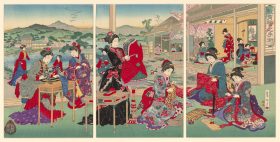Ah, summer break. Time at last to put aside the To Do list and catch up on the To Read list you have been compiling all year. But perhaps you have been too busy to think about what you want to read. Perhaps you are flummoxed the constant suggestions from publishers that arrive in your inbox. Or maybe you have the To Read list but it is longer than your summer holidays.
Choosing holiday reading can make you feel like Italo Calvino’s archetypal reader in If on a Winter’s Night a Traveller fighting your way past ‘a thick barricade of Books You Haven’t Read… phalanxes of the Books You Mean To Read But There Are Others You Must Read First, the Books Too Expensive Now And You’ll Wait Till They’re Remaindered, the Books ditto When They Come Out in Paperback, Books You Can Borrow From Somebody, Books That Everybody’s Read So It’s As If You Had Read Them, Too’.
Too much choice is a modern malady and the last thing you need when you are ready to relax so we’ve trawled the year’s literary stories, checked out our reviews, listened to the prize judges and taken the advice of ArtsHub members to produce your essential summer reading list.
1. 1. The big winner (local)…
All that I Am by Anna Funder won a stunning seven major awards this year including the Miles Franklin Award, the Australian Society of Authors Barbara Jefferis Award and the Australian Book Industry Book of the Year. We think it deserved them all too. The first novel from the non-fiction writer of Stasiland, is a compelling fictionalisation of the all-too-true lives of the women and men of the German left in the 1930s as they fled into exile and attempted unsuccessfully to topple Nazism through subterfuge and intrigue. The Australian link is in the memories of the old lady, based on Ruth who was once a freedom-fighter in the secret that preceded World War II.
Funder has found a tale too little known and turned it into a fascinating exploration of personality and politics, bravery and betrayal. It’s compulsive reading with something to chew on.
2. 2. The big winner (international)…
2012 was not a great year on the international literary prize scene. For the first time in 35 years the Pulitzer Prize judges declined to award a fiction prize. The judges could not agree among the three shortlisted books David Foster Wallace’s The Pale King, Karen Russell’s Swamplandia and Denis Johnson’s novella Train Dreams.
The Man Booker prize judges were more decisive but not highly imaginative. They gave the prize to Bringing up the Bodies by Hilary Mantel, the sequel to Mantel’s Wolf Hall, which won in 2009. Both are meaty historical novels based on the life of Thomas Cromwell, the powerful minister in the court of King Henry VIII. The two books are the kind of hefty, detailed and absorbing reading. If you choose these, you won’t need to pack much else for a week’s holiday.
3. Because you’re a bibliophile…
ArtsHub member and literary blogger Helena Tonile of my-cup-and-saucer.com recommends Mr Penumbra’s 24-hour Bookstore by Robin Sloan as her top read of 2012 and we suspect lots of book lovers will agree. This is a lovely undemanding read with a chewy slant on the experience of reading. Sloan – who has previously published short e-book only works – has crossed into traditional publishing with a book about books in their many forms. The novel is Da Vinci Code meets Samuel Johnson, part mystery, part ode to books in their many paper and digital forms. Sloan is interested in the power of the book – whether codex or Kindle. One to enjoy whatever medium you choose to read it on.
4. Music for your eyes…
A must for musicians and a strong recommendation for anyone curious about the music industry is How Music Works by David Byrne. Perhaps better entitled How the Music Business Works, this book is part memoir, part exploration of the business and part discursive musings on anything vaguely related to music. The Talking Heads songwriter and now solo musician ranges take a thoughtful and positive look at the implications of digital technology for musicians.
5. 5. In your suitcase…
If you are travelling overseas these holidays, especially if you are a tourist in places where locals don’t have that luxury, pack the latest thought-provoking novel from Michelle de Krester, Questions of Travel. In a timely and powerful novel, de Krester creates a striking counterpoint between the story of a Sri Lankan refugee and a restless Australian tourist. The characters and story are engaging and the language is readable but the themes are tough stuff. This is the kind of novel that ought to be impacting not just dinner party conversation but also the political discourse, bringing a searing humanity to puncture our illusions about asylum seekers and our comfortable middle-class lives in the global suburbs.
6. 6. The writer as celebrity…
The extraordinary Salman Rushdie has finally published the story of his years in hiding in the nicely title Joseph Anton – the pseudonym he took from the names of his two favourite writers Conrad and Chekhov. A chunky celebrity biography with plenty of name-dropping and a truth-stranger-than-fiction sense of the cloak-and-dagger, Joseph Anton traces Rushdie’s experience from the fatwa issued by Ayatollah Khomeini in 1989 in response to his novel The Satanic Verses. This literary gossip of the highest order but it’s much more than that. If Rushdie does not always endear us to him as a man, we must feel for him as a writer persecuted for his work.
7. 7. To get your creative juices flowing…
This is a tough one. We know that artists and arts lovers will be fascinated by Jonah Lehrer’s popular science work Imagine: How Creativity Works. But within months of the books release – with more than 200,000 copies sold – journalist Michael Moniyhan revealed Lehrer had fabricated quotes from Bob Dylan. Other accusations of plagiarism, recycling and fabrication have also dogged Lehrer and we can’t recommend Imagine without acknowledging its veracity is tainted. As journalists we don’t like the idea of promoting a fabricator either. But this book is so right for our readers it seems a shame to dismiss Lehrer’s survey of how neuroscience and social studies cast light on the creative process. Plus it’s been the centre of book gossip all year. Read with caution but read.
8. 8. Not for your tablet…
If you are looking for compact reading to take away, skip this section. But if you are a visual person ticked by design treat yourself to Building Stories by Chris Ware. An innovative graphic novel which almost crosses the line from ‘book’ to ‘toy’, Building Stories is actually a box containing 14 elements including a hardback codex (that’s what we used to call a book), a Monopoly-style board, a flapping newspaper and various pamphlets. It has elements of a ‘choose your own adventure’ as readers can decide the order in which they approach the different elements but it’s not just a medium-driven game. The graphic stories within this work are strictly for grown-ups, filled with ordinary disappointments, lost opportunities and existential angst. The medium plays intelligently with the way we observe and remember the world.
9. 9. But oh that deep romantic chasm…
From Samuel Coleridge to Salvador Dali to Jim Morrison, writers, artists and musicians have found hallucinations a source of inspiration – whether inspired by dream states, drugs, mental illness or just highly active imaginations. The inimical Oliver Sacks (The Man who Mistook his Wife for a Hat) is the perfect writer to explore the phenomenon and Hallucinations explores the visions that come not just from drugs and dreams but also from sensory deprivation, intoxication, illness, or injury. Read this one on a lazy day, then close your eyes and open your mind to the possibilities.
10. 10. Because you can’t make up your mind…
‘What are you reading?’ It’s a question we often use to connect with friends or strangers but in this remarkable book it is the way a son bridges the distance to a mother who is dying. In the ensuing final months Will Schwalbe and his mother Mary Anne discuss life through books, travelling a path that is both deeply personal and able to transcend their tragic circumstance to deal in the ideas like gratitude, courage and comfort. The End of Your Life Book Club is a potent illustration of the way books in particular and art in general enhances lives. It’s also a chance to enjoy vicariously the eclectic titles that the conversation covers – and no doubt end up with yet another long To Read list.





